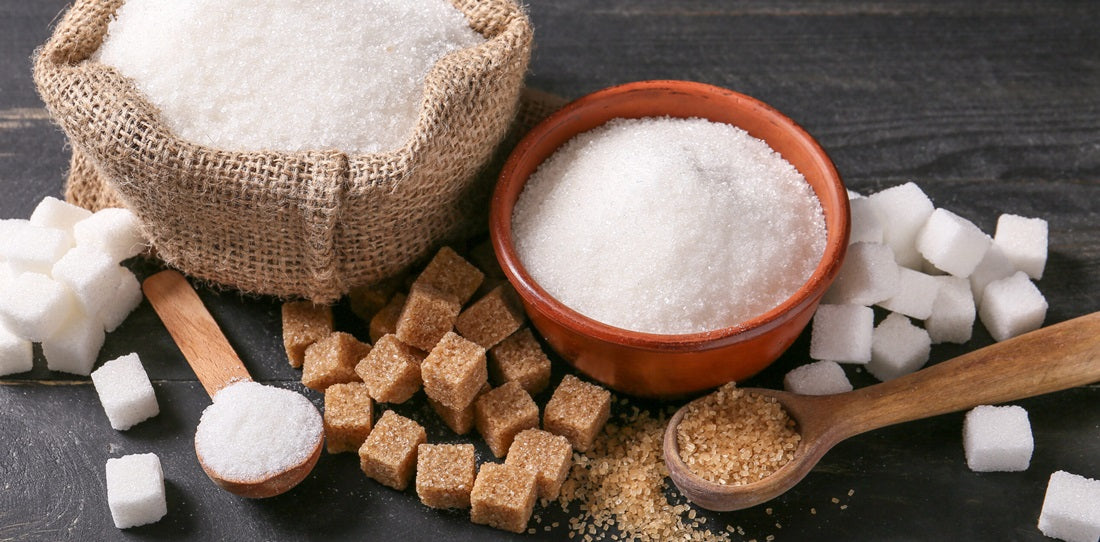The use of sugar nowadays has become an integral part of daily life and is found in almost every food product, not only in sweets and soft drinks. For example, it can be found in bread, flavored yogurts, protein and granola bars, salad dressings, and even in products designed for family health, such as fermented drinks with probiotic bacteria. The average amount of sugar in a bottle of such a drink is 12 grams. What are the consequences?
There is widespread discussion about the fact that too much sugar every day is bad, but why?
Several health problems are associated with regular, excessive sugar consumption:
👉Weight Gain: Excessive sugar consumption (including in children) can lead to obesity, which is a risk factor for the development of various chronic diseases. Why? - Sugar not used for energy turns into fats, accumulating in fat cells.
👉Fatigue: While sugar provides immediate energy, it is followed by a rapid energy drop.
👉Acne: High sugar intake can cause acne, especially in teenagers.
👉Tooth Decay: Sugar feeds bacteria in the mouth, leading to demineralization and cavities.
👉Heart Disease: High sugar consumption can contribute to high blood pressure, inflammation, and fatty liver disease. All of these are risk factors for heart attack and stroke.
👉Kidney Disease: Fructose can increase uric acid levels in the blood, leading to the development of kidney disease, and consistently high blood sugar levels can damage the small blood vessels in the kidneys.
👉Gout Risk: Excessive sugar consumption can increase the risk of gout.
Not all sugar consumed daily is absorbed (malabsorption). It travels beyond the digestive tract to reach the colon, where it encounters 1.5-3 kg of hungry bacteria or our intestinal microbiome, which needs a food source to exist. Our microbiome inhabitants are diverse, and those who 'like' sugar will do everything possible to get more.
Many of these microorganisms are considered opportunistic pathogens or bad bacteria. The more sugar we consume, the more sugar-loving (saccharolytic) bacteria multiply, reducing our own probiotic or good bacteria. In other words, our microbiome ecosystem is disrupted, and the consequences for both children and seniors include:
👉Abdominal Bloating: Unabsorbed sugar in the colon feeds bacteria that produce gas, causing abdominal bloating and discomfort. Especially relevant for people with digestive system problems such as IBS or SIBO.
👉Increased Sugar Cravings: Sugar promotes the growth of 'bad' bacteria in the intestines, leading to increased cravings for sweets, as these bacteria 'demand' more sugar.
👉Depression and Lack of Energy: The gut microbiome is closely linked to mood and overall energy levels. Imbalance can cause feelings of depression and lack of energy.
👉 Skin Problems: The gut microbiome also affects skin health. Imbalance can lead to skin problems such as eczema, acne, and other skin conditions.
👉Increased Susceptibility to Illness: Since most of the immune system is located in the gut, a microbiome imbalance can affect immune system function, increasing the risk of illness.
What can you do?
Firstly, we recommend reducing sugar intake and increasing fiber in your diet.
However, making these changes is not so easy. Prolonged sugar consumption has caused a greater or lesser dependence, which is maintained by bidirectional communication between the brain and the gut - the so-called gut-brain axis.
In simple terms, bacteria send signals to the brain, influencing hormones responsible for appetite and intensifying sugar cravings to provide a food source for 'bad' bacteria.
To reduce the number of wrong signals sent, it's essential to decrease the number off those senders! One of the most effective ways to do this is to increase our own probiotic 'good' bacteria by providing them with a suitable food source – prebiotics.
Prebiotics – these soluble fibers cannot be consumed by 'bad' bacteria, but 'good' bacteria can. Therefore, 'good' bacteria multiply, gaining the upper hand over 'bad' bacteria and, in the long run, helping regulate our body and prevent many of the well-being and health issues mentioned earlier.
Not all 'good' bacteria eat the same prebiotics, so it's crucial to choose the most valuable prebiotics, without additional sweeteners. (For example, by eating whole-grain bread every day, which contains not only the prebiotic beta-glucans but also sugar, we will feed both 'good' and 'bad' bacteria.)
Preimmu = 150 different compounds that provide a very broad multiplication of our probiotics ('good' bacteria). Using 1 sachet per day, you will notice reduced sugar cravings and improved well-being already in the first month.


